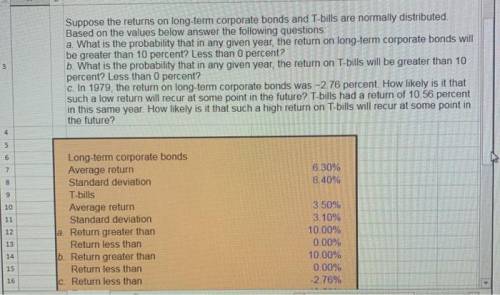
Business, 17.08.2020 01:01 ARandomPersonOnline
suppose the returns on long term corporate bonds and T-bills are normally distributed. Based on the values below answer the following questions: what is the probability that in any given year, the return on long-term corporate bonds will be greater than 10 percent? long term corporate bonds average return= 6.30%

Answers: 2


Another question on Business

Business, 22.06.2019 14:40
In the fall of 2008, aig, the largest insurance company in the world at the time, was at risk of defaulting due to the severity of the global financial crisis. as a result, the u.s. government stepped in to support aig with large capital injections and an ownership stake. how would this affect, if at all, the yield and risk premium on aig corporate debt?
Answers: 3

Business, 22.06.2019 16:00
In a perfectly competitive market, the long-run market supply curve tends to be horizontal or nearly so. what is another way to state this fact? (a) market supply is much more elastic in the long run than the short run. (b) in the long run, average total cost is minimized. (c) in the long run, price equals marginal cost. (d) market supply is much less elastic in the long run than the short run.
Answers: 1

Business, 22.06.2019 17:10
At the end of the current year, accounts receivable has a balance of $550,000; allowance for doubtful accounts has a credit balance of $5,500; and sales for the year total $2,500,000. an analysis of receivables estimates uncollectible receivables as $25,000. determine the net realizable value of accounts receivable after adjustment. (hint: determine the amount of the adjusting entry for bad debt expense and the adjusted balance of allowance of doubtful accounts.)
Answers: 3

Business, 22.06.2019 19:00
Adrawback of short-term contracting as an alternative to making a component in-house is thata. it is the most-integrated alternative to performing an activity so the principal company has no control over the agent. b. the supplying firm has no incentive to make any transaction-specific investments to increase performance or quality. c. it fails to allow a long planning period that individual market transactions provide. d. the buying firm cannot demand lower prices due to the lack of a competitive bidding process.
Answers: 2
You know the right answer?
suppose the returns on long term corporate bonds and T-bills are normally distributed. Based on the...
Questions

Mathematics, 17.11.2019 04:31

Mathematics, 17.11.2019 04:31


English, 17.11.2019 04:31

Health, 17.11.2019 04:31


Biology, 17.11.2019 04:31



History, 17.11.2019 04:31

Health, 17.11.2019 04:31







Mathematics, 17.11.2019 04:31

Spanish, 17.11.2019 04:31

Mathematics, 17.11.2019 04:31




